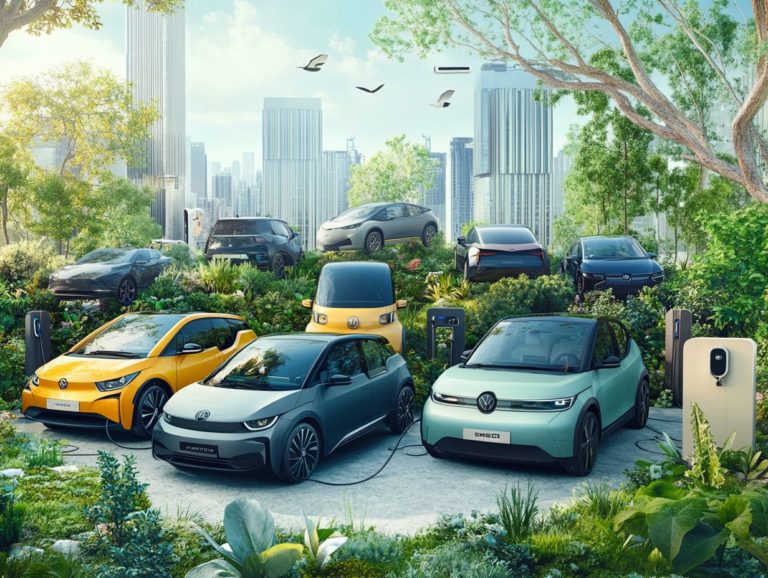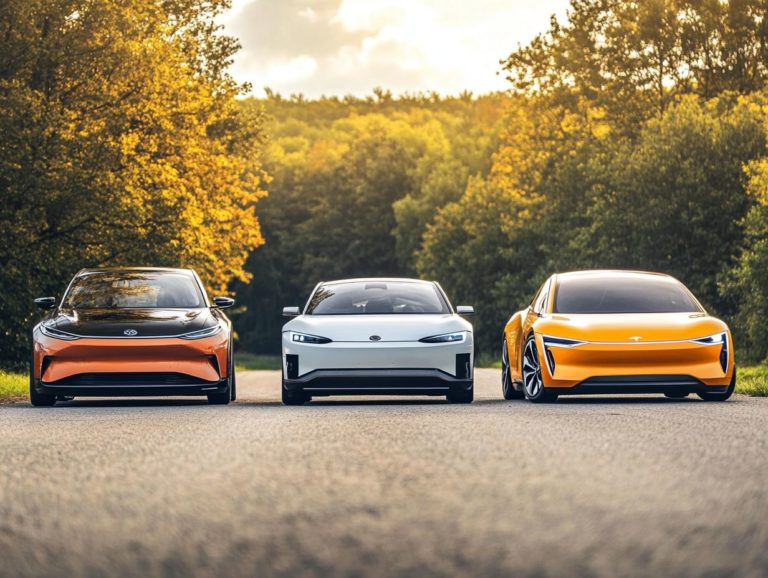how do electric vehicles compare in cost?
As electric vehicles (EVs) gain popularity, you might be curious about their costs.
This article explores various aspects of owning an electric vehicle, from initial prices to long-term savings.
You’ll find a breakdown of operating and maintenance costs and learn about government incentives that can lower your expenses.
This guide offers insights for both first-time buyers and those just curious about the financial aspects of EVs.
Contents
- Key Takeaways:
- Overview of Electric Vehicles
- Cost Comparison of Electric Vehicles
- Factors Affecting Cost of Electric Vehicles
- Long-Term Cost Savings of Electric Vehicles
- Considerations When Choosing an Electric Vehicle
- Common Questions About Electric Vehicles
- How do electric vehicles compare in cost to traditional gasoline vehicles?
- Are there any government incentives or tax breaks for purchasing an electric vehicle?
- How do the maintenance costs of electric vehicles compare to traditional gasoline vehicles?
- Do electric vehicles have a higher resale value than traditional gasoline vehicles?
- How does the cost of electricity for charging an electric vehicle compare to the cost of gasoline?
- How does the cost of insurance for electric vehicles compare to traditional gasoline vehicles?
Key Takeaways:
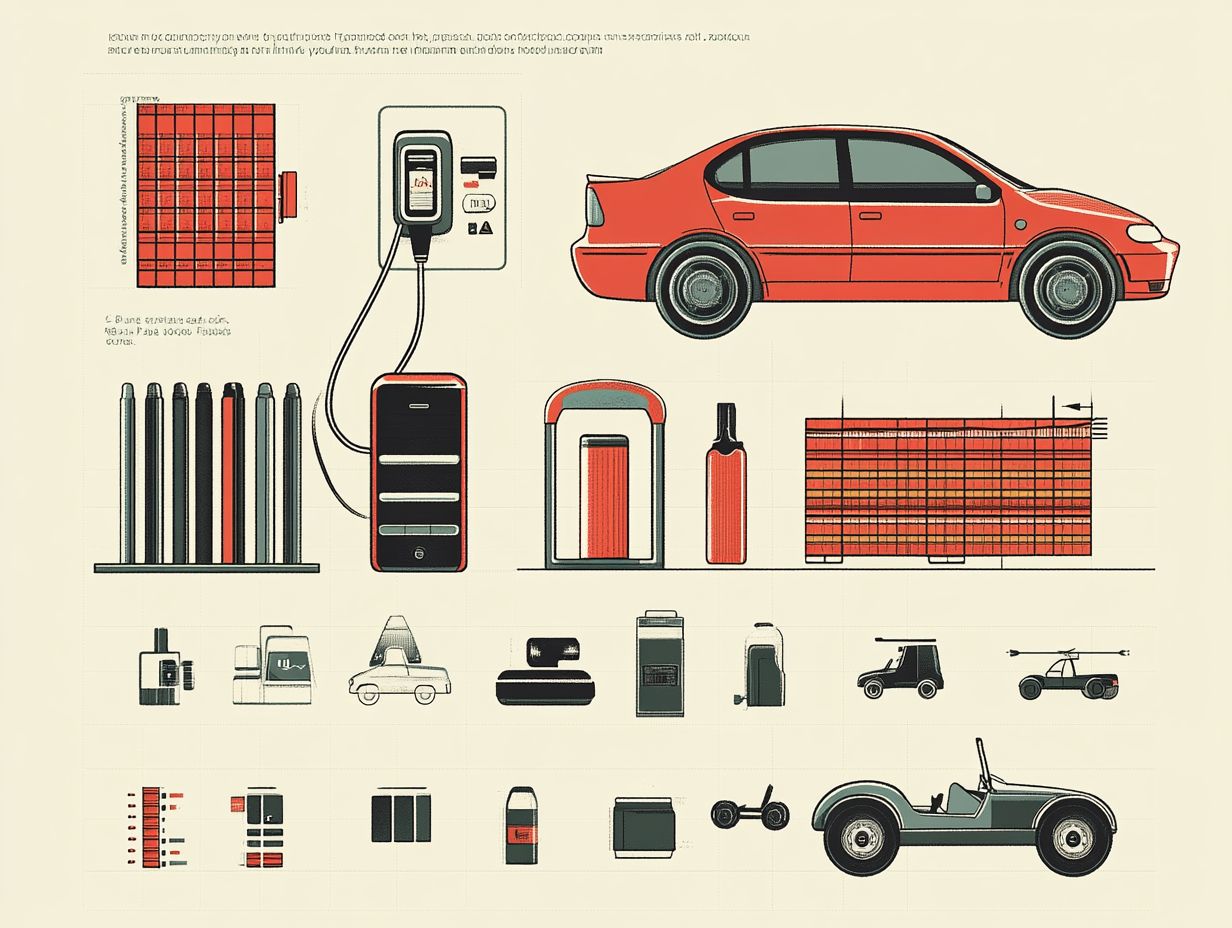
Electric vehicles may cost more upfront but save you money over time on operating and maintenance.
Government incentives, battery life, and charging options can influence the costs of EVs.
Despite the initial expense, owning an EV can lead to significant savings due to lower operating costs.
Overview of Electric Vehicles
Electric vehicles (EVs) are transforming the automotive industry, creating cleaner, energy-efficient transport options.
Unlike gas-powered cars, EVs run on electricity, which helps reduce greenhouse gas emissions.
This shift towards electric mobility is essential for sustainability, with popular models like the Tesla Model Y and Nissan Leaf leading the way.
With advances in technology and government support, EVs are becoming a practical choice for everyday driving.
What are Electric Vehicles?
Electric vehicles (EVs) are innovative cars powered by batteries instead of gasoline engines.
These vehicles use electric motors to convert stored energy into motion, offering a quiet and efficient driving experience.
There are several types of EVs available:
- Battery electric vehicles (BEVs) run solely on electricity.
- Plug-in hybrid electric vehicles (PHEVs) combine an electric motor with a gasoline engine.
- Fuel cell electric vehicles (FCEVs) generate electricity through a chemical reaction.
This technology significantly reduces greenhouse gas emissions and reliance on fossil fuels, promoting a sustainable future for urban mobility.
Cost Comparison of Electric Vehicles
When assessing ownership costs, comparing electric vehicles (EVs) with traditional gas-powered cars is crucial.
You may find key differences that could impact your budget significantly.
The purchase price of EVs varies based on the model and available federal incentives, but their long-term savings on fuel and maintenance often justify the initial cost.
Maintenance and utility costs are also important factors in understanding the total cost of owning an EV. It s essential to conduct a thorough cost analysis to grasp your financial commitment.
Initial Purchase Cost
The initial purchase cost of electric vehicles (EVs) can vary significantly based on the model, federal incentives, and available rebates. It s vital to explore options like the Tesla Model Y and the Nissan Leaf.
Factors such as model pricing, dealership options, and state-specific incentives greatly impact your overall investment. For example, while the Tesla Model Y boasts impressive features and performance, its price reflects a premium investment compared to budget-friendly alternatives like the Nissan Leaf.
Dealers may also provide special financing offers or trade-in options that can affect the total cost. Don’t miss out on potential federal tax credits that can lower your costs, making it easier for you to shop for an EV.
Conducting a thorough comparison between high-end models and more accessible ones will empower you to make informed and confident choices.
Operating Costs
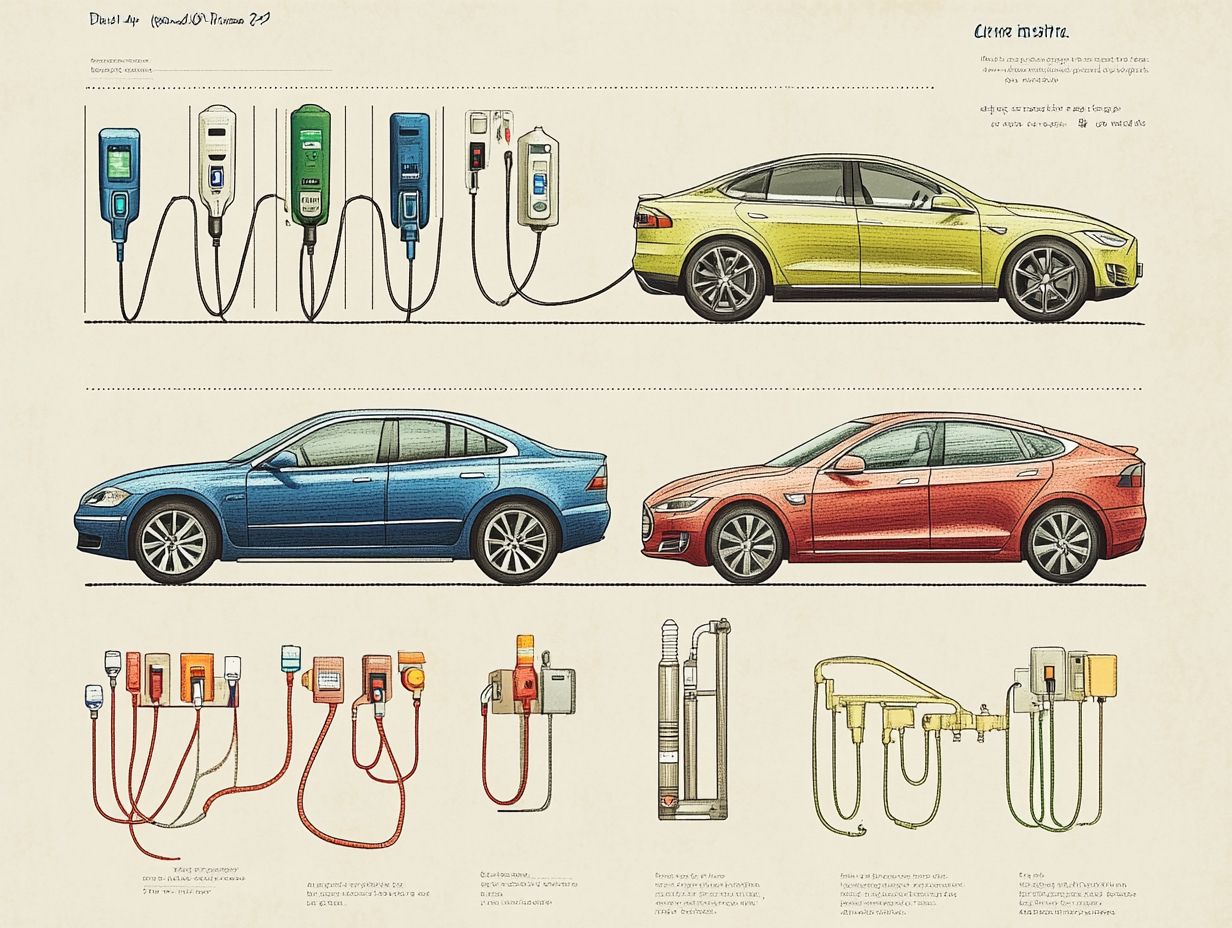
Operating costs for EVs typically revolve around electricity for charging, which often translates into significant savings compared to gasoline expenses. This makes EVs a compelling choice for budget-conscious individuals.
When considering overall expenditure, it s essential to include not just the cost of charging but also the reduced maintenance expenses that come with electric vehicles. Unlike traditional gasoline-powered cars, EVs have fewer moving parts, potentially leading to lower long-term upkeep costs.
Research shows that, depending on local utility rates, the savings from charging can reach hundreds of dollars annually.
When you examine the total cost of ownership against gasoline vehicles, it’s clear that the economic benefits enhance the appeal of making the switch. By thoughtfully evaluating these factors, you can understand how electric vehicles could save you money and emerge as a financially savvy choice.
Maintenance Costs
Maintenance costs for electric vehicles are often lower than those for traditional gas-powered vehicles, thanks to fewer moving parts and less frequent service requirements.
This advantage arises from the lack of complex components typically associated with internal combustion engines, such as oil filters and exhaust systems.
Studies indicate that, as an EV owner, you’ll schedule service checks far less often. Plus, you’ll benefit from reduced brake wear due to regenerative braking technology (which helps recharge the battery while slowing down).
According to a recent report from the Department of Energy, maintenance expenses for electric vehicles can be roughly 30% lower over the vehicle s lifespan.
This financial edge is significant, allowing you to redirect funds toward upgrades or savings instead of routine upkeep, making electric vehicles increasingly appealing in today s eco-conscious market.
Factors Affecting Cost of Electric Vehicles
Several factors shape the cost of electric vehicles (EVs), ranging from government incentives and rebates to battery life longevity and charging infrastructure availability.
Each of these elements plays a crucial role in determining the overall expenses tied to owning an EV.
Government Incentives and Rebates
Government incentives and rebates are essential for making electric vehicles more affordable. Federal tax credits can significantly lower your initial purchase cost, making that sleek EV more attainable.
The benefits don t stop at the federal level; local and state initiatives also play a significant role in your savings. For example, the U.S. Department of Energy offers various rebates that could add up to thousands of dollars.
Thanks to the Inflation Reduction Act, you might be eligible for a federal tax credit of up to $7,500, depending on factors like battery capacity and the manufacturer’s sales volume.
Plus, income limits are in place to ensure that lower and middle-income households can take advantage of these savings. This not only helps you save money but also encourages a transition toward greener transportation alternatives.
Ready to explore your EV options? Start comparing models today!
Battery Life and Replacement Costs
The battery life of electric vehicles (EVs) significantly impacts your long-term ownership costs. Replacement expenses can dramatically shape your overall savings and emissions reduction goals.
Understanding this detail is essential for potential buyers. The average lifespan of an EV battery ranges from 8 to 15 years, influenced by usage patterns and climate. Be aware that replacement costs can vary widely, often exceeding several thousand dollars. This will ultimately affect your total cost of ownership.
Fortunately, advancements in battery technology, including improved chemistry and innovative cooling systems, are boosting both longevity and efficiency. This reduces long-term expenses and gives you the power to make informed decisions.
As the landscape evolves, it strengthens the case for electric vehicles as a sustainable and economically savvy choice.
Charging Infrastructure
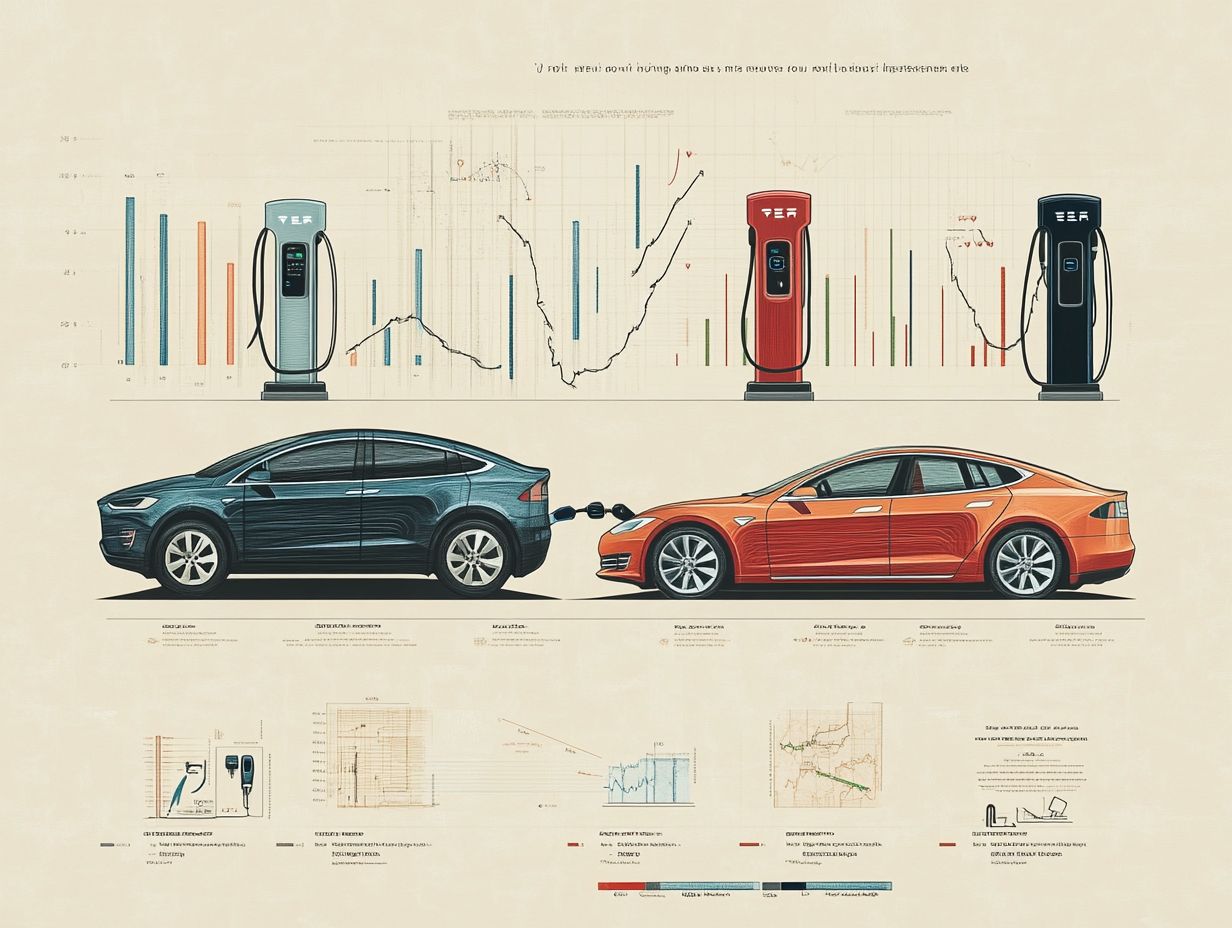
The availability of charging infrastructure plays a crucial role in your journey toward adopting electric vehicles. The installation costs and convenience of these stations can greatly influence your overall experience and potential savings.
You have several types of charging stations available, including:
- Level 1 chargers (standard household outlets)
- Level 2 chargers (faster charging, often used at home and public locations)
- DC fast chargers (quick charging, suitable for long trips)
The installation costs for these stations can vary widely, often depending on your location and local regulations. As governments roll out tax credits and rebates, the push for greater accessibility is gaining momentum.
This evolving landscape impacts your operating costs as an EV owner and shapes your choices. More people are drawn to electric vehicles as practical, economical alternatives to traditional gasoline-powered cars.
Long-Term Cost Savings of Electric Vehicles
The long-term cost savings associated with electric vehicles frequently surpass their initial purchase price.
By considering lower operating costs, reduced maintenance expenses, and the potential for decreased emissions, you’ll see that opting for an EV is a financially astute decision.
Calculating Total Cost of Ownership
Calculating the total cost of ownership for electric vehicles requires examining various expenses, including the initial purchase price, operating costs, and maintenance.
This process invites a thorough look at several cost components, such as:
- Comparing electricity costs with gasoline prices
- Evaluating insurance premiums
- Considering potential tax incentives
By comparing these factors against traditional vehicles, the benefits of electric vehicles become increasingly apparent. For instance, learning how to compare electric vehicle ownership costs can reveal significant savings. The U.S. Department of Energy highlights that you could save over $4,000 in fuel costs over five years by choosing an electric vehicle.
Lower maintenance costs, often a result of fewer moving parts in electric drivetrains, make them even more appealing for those who are budget-conscious.
Considerations When Choosing an Electric Vehicle
When selecting an electric vehicle, evaluate several key factors such as range, performance, and the availability of tax credits and incentives.
These elements can significantly shape your purchasing decision, ensuring you make a choice that aligns with your needs and preferences.
Range and Performance
Range and performance are crucial metrics that influence your choices when it comes to electric vehicles. These factors affect not just your driving experience but also your overall efficiency and satisfaction.
In a time when sustainability takes center stage, the significance of these factors cannot be overstated. Automakers are diligently working to meet and surpass industry standards. Recent breakthroughs in battery technology and energy-efficient designs have markedly enhanced the longevity and speed of electric vehicles.
You, as a consumer, are now more informed than ever and expect transparency regarding range and performance in various conditions. Manufacturers, keenly aware of this demand, have adopted stringent testing protocols and provided real-world data to build your confidence. This ultimately sways your preferences toward electric options over traditional combustion engines.
Now is the perfect time to consider switching to an electric vehicle!
Available Tax Credits and Incentives
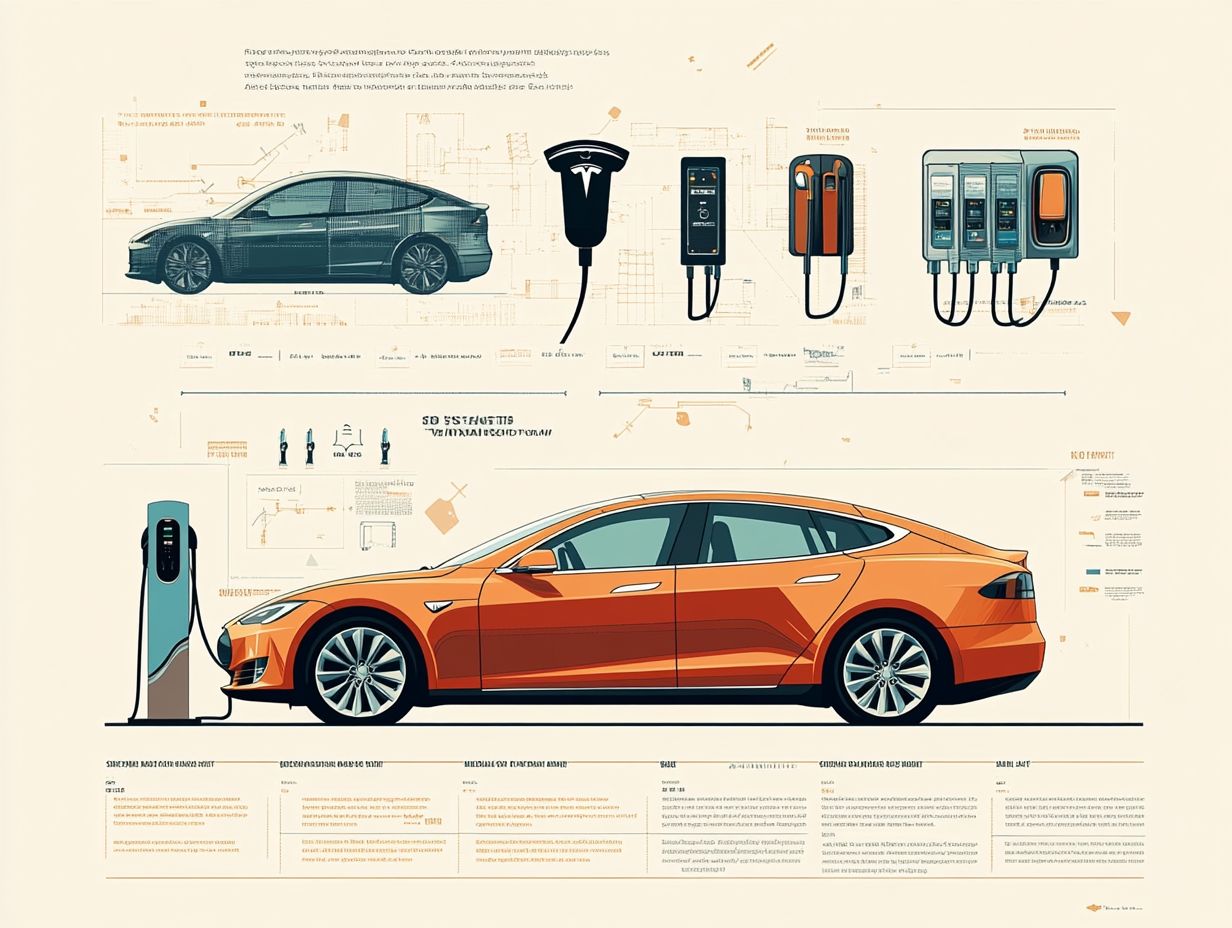
Tax credits and incentives can significantly reduce the cost of electric vehicles. This makes them a smart choice for budget-conscious buyers!
Various programs at federal and state levels encourage eco-friendly transportation. These include tax credits, rebates, and reduced registration fees.
Stay updated on any changes to policies and eligibility. These shifts can affect the true cost of ownership.
Understanding these tax benefits helps you budget effectively. It empowers you to make informed choices aligned with your financial and environmental goals.
Common Questions About Electric Vehicles
How do electric vehicles compare in cost to traditional gasoline vehicles?
The initial cost of purchasing an electric vehicle is typically higher than a traditional gasoline vehicle due to the cost of the battery technology. However, what is the average cost of an electric vehicle? is just one factor to consider, as electric vehicles have lower operating costs and can save drivers money in the long run due to lower maintenance and fuel costs.
Are there any government incentives or tax breaks for purchasing an electric vehicle?
Yes, many governments are eager to encourage the switch to electric vehicles. Take advantage of tax credits, rebates, and discounts while they last!
How do the maintenance costs of electric vehicles compare to traditional gasoline vehicles?
Electric vehicles have fewer moving parts and do not require regular oil changes, resulting in lower maintenance costs compared to traditional gasoline vehicles. However, the cost of replacing the battery in an electric vehicle can be expensive.
Do electric vehicles have a higher resale value than traditional gasoline vehicles?
It depends on the specific make and model of the vehicle, but in general, electric vehicles tend to have a higher resale value than traditional gasoline vehicles due to their lower maintenance costs and increasing demand for sustainable transportation.
How does the cost of electricity for charging an electric vehicle compare to the cost of gasoline?
On average, the cost of electricity for charging an electric vehicle is significantly lower than the cost of gasoline for traditional vehicles. This can result in substantial savings for drivers, especially in areas with high gas prices.
How does the cost of insurance for electric vehicles compare to traditional gasoline vehicles?
The cost of insurance for electric vehicles is typically similar to traditional gasoline vehicles. However, some insurance companies may offer lower rates for electric vehicles due to their lower risk of accidents and lower maintenance costs. It’s best to shop around and compare insurance quotes for both types of vehicles.

